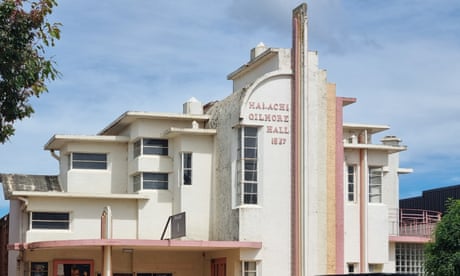- by foxnews
- 08 Apr 2025
Art deco gem’s renewal gets NSW country town back in the dance
Art deco gem’s renewal gets NSW country town back in the dance
- by theguardian
- 25 Apr 2022
- in news

After a 40-year intermission, the historic Malachi Gilmore hall at Oberon has thrown open its doors with a performance of The Rivoli by Sydney's Dance Makers Collective. The high-energy touring show - a celebration of mid-century dance halls and their communities - reflects something of the venue's chequered history.
The art deco gem, known affectionately as the Malachi, was built in 1937 and once sat centre-stage in the New South Wales central-west town.
As co-owner Lucy East explains, the venue served as a cinema, dance hall and roller-skating rink, with a supper room downstairs. By the 1970s and 80s, television and video stores were robbing cinemas of patrons, and Friday night dances fell out of fashion. In 1982, the Malachi closed its doors to the public.
Until 2017, it operated as a warehouse for wool bales, with a small craft shop out the front; a somewhat undignified hiatus for a building that had for so many years acted as the social hub and beating heart of the community.
East discovered the property was for sale during a road trip that year.
She has links to Oberon - her grandfather was born there - but wasn't aware her family had a connection to the Malachi. A conversation with her father revealed that the cinema's first projectionist was her great-uncle.
East, a visual artist with a background in music education, says: "I needed something that was going to spark creativity and community. It was a perfect fit."
It was designed by architect Virgil Cizzio, who subsequently worked on Sydney's Great Southern Hotel and the Imperial at Erskineville.
Architect and senior heritage consultant Roy Lumby describes the Malachi as "one of the most striking public halls of the 1930s" in his book A Spirit of Progress: Art Deco Architecture in Australia.
Few art deco theatres in Australia have retained their original heritage value, and fewer still are being used in their original capacity as cinemas or performance spaces.
According to East, the Malachi was fortunate to have been relatively well-preserved during its stint as a wool store. When she and her husband, Johnny, bought the building, many art deco elements remained, somewhat neglected, such as the original proscenium arch over the stage, Caneite ceiling panels crafted from sugarcane refuse, and the fancy rosy plasterwork.
Funding from the NSW government helped return the state heritage-listed building to a viable venue, and federal grants are in place to assist with programming, marketing and technical support. But the reactivation faced serious obstacles.
The original launch had to be cancelled when the 2019 Black Summer bushfires threatened nearby towns.
"The band were fighting fires on their roofs, they closed the Great Western Highway, we were 24 hours out, and no one was in the mood," East says. "So we just put this little notice up saying we've got all this food, come, we'll have a little bit of a dance."
Then Covid hit. Theatres around the country fell silent, shows and festivals were forced to postpone or cancel entirely. But what happens to the crowd when the show can't go on?
The Australia Council for the Arts has monitored shifts in live-audience sentiment caused by the pandemic. It sees the arts playing a role in enabling recovery and re-connection within communities, reviving tourism and the economy.
While regional audiences have been more cautious than their metropolitan counterparts to return to events - possibly due to the slower roll-out of vaccines in the regions - the reopening of the Malachi coincides with a rise in live performance attendance levels nationally.
According to the Australia Council's Live Attendance Outlook for March, 79% of audiences reported making plans to attend an in-person cultural event in the near future, up from 74% in November, according to data that includes Australia's regional performing arts venues and companies
Although initial ticket sales were slow - another trend the Australia Council observed - the two performances of The Rivoli at the Malachi saw full houses.
Some who joined the cast on the restored dance floor had rehearsed to be part of the performance, after East advertised for residents to participate.
"The show had eight wonderful contemporary dancers spinning and grinning, taking the audience on a glorious trip from the structural steps of the Pride of Erin to the strobe-lit hectic pace of a full-on rave," she says.
"One of the Oberon residents participating in the show was Nancy Dennis, 86, who, after her turn in the choreography, was seen instinctively tapping her foot to the climatic house music."
With its proximity to Kanangra-Boyd National Park and Jenolan Caves, its focus on foraging and food experiences and its cool-climate gardens, Oberon is well-placed to see an increase in cultural tourism.
East's approach is one of inclusive goodwill, employing local tradespeople, providing front-of-house opportunities for locals and scheduling concerts of original music that will feature local artists.
She's also planned a diverse line-up of events, such as stage-to-screen performances of Sydney festival productions, Indigenous stand-up comedy, and travelling art exhibitions.
"Everyone says that no one will ever accept you if you're a blow-in, that sort of talk about city-slickers, especially arty ones," she says.
"I'm trying to be as inclusive as I possibly can because we're just custodians of this building."
- by foxnews
- descember 09, 2016
Ancient settlement reveals remains of 1,800-year-old dog, baffling experts: 'Preserved quite well'
Archaeologists have recently unearthed the remarkably well-preserved remains of a dog from ancient Rome, shedding light on the widespread practice of ritual sacrifice in antiquity.
read more


